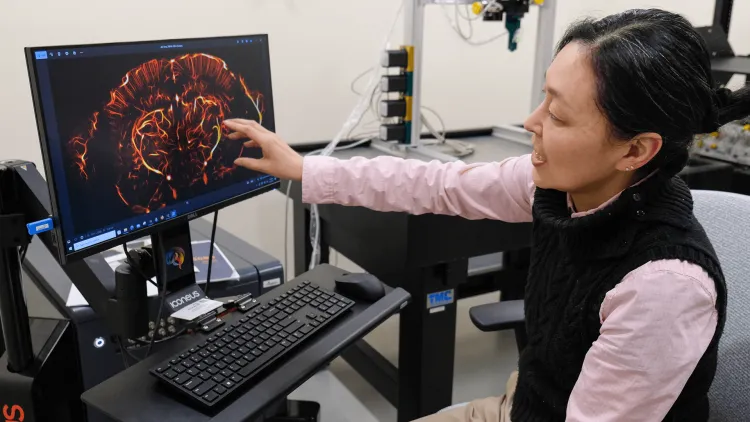A hormone that controls blood pressure may lead to cognitive decline, even without changing blood pressure.
Leading-edge research by Masayo Koide, Ph.D., M.S., research assistant professor of pharmacology at the Larner College of Medicine, explores a possible link between excessive levels of aldosterone—a hormone that regulates blood pressure by managing levels of sodium and potassium in the blood—and vascular dementia—cognitive decline caused by interrupted blood flow to the brain.
High blood pressure affects one out of two adults in the United States, and it can quietly damage the body for years, slowly leading to cardiovascular disease and impaired blood flow to the brain. More than 57 million people worldwide live with dementia, according to the World Health Organization, and at least 80 percent of people with dementia have issues related to the brain’s blood supply.
Koide received a prestigious R01 grant from the National Institutes of Health for the study, “Aldosterone-Vascular Signaling on Cerebral Small Vessel Function.” The $2.7 million award supports Koide and her team of seven investigators, including graduate and undergraduate students, in exploring why aldosterone levels become elevated in some people, and how this affects brain blood vasculature, thinking, and memory.
“Aldosterone is important to blood pressure regulation, but it needs to be at the correct level. Too much aldosterone can cause vascular dysfunction that is not limited to people with high blood pressure,” Koide says, adding that elevated aldosterone levels occur in 10 to 15 percent of people with normal blood pressure. “Some people with normal blood pressure who feel healthy and have excess aldosterone may develop vascular dementia later in life.”

This project evolved from Koide’s earlier research as a project director for the Vermont Center on Cardiovascular and Brain Health (VCCBH), which provides mentoring and core support for research project leaders and early-career investigators studying a multitude of heart- and brain-health issues. Koide’s VCCBH project examined the impact of chronic high blood pressure on the blood flow in the brain and its underlying mechanisms, centering on aldosterone as a crucial player. VCCBH supported Koide in applying for the NIH R01 grant to establish her own lab and continue this important work. Ultimately, Koide’s investigations will help to develop therapeutic remedies to prevent cognitive decline.
Research like this has contributed to the University of Vermont’s designation by the Carnegie Classification of Institutions of Higher Education as an R1 institution, placing it in the top tier of research universities in the U.S.

